- Home
- J. T. Edson
The Rebel Spy Page 6
The Rebel Spy Read online
Page 6
“Bring in that box, gentlemen,” the girl ordered.
“Sure, Miss Boyd,” Tolling answered and left the room followed by Dusty.
“Captain Fogg captured a Yankee agent on his way to the Choctaw village,” Belle explained to Ludlow. “Maybe his property will tell us something of your mission.”
Watching the man, Belle noticed him give a shocked start as he saw the box Dusty and Tolling carried in. She drew the key from her pocket as the men set the box down before Ludlow, placing it between his hands on the table. Fear flickered across Ludlow’s face as she walked forward. Then his features set into hard lines. Realising that he stood a good chance of dying, Ludlow found some comfort in the fact that the girl who humiliated and captured him would also be killed. Anger at Belle for out-smarting him over-rode his knowledge of what would happen when she inserted and turned the key.
“Hold it, Miss Boyd!” Tolling said urgently, just before the key entered the lock. “There may be an infernal contrivance in the keyhole.”
“That’s true enough,” the girl admitted and stepped back. “Could you break the lock with a bullet from outside the room, Dusty?”
“Easy enough,” Dusty replied.
“Then we’ll go outside and watch you do it.”
Although Belle, Tolling and Dusty retired from the cabin, they left Ludlow inside. Desperately he strained at his bonds, but the ropes held firm. Out in the open, at the far edge of the door’s light, Belle and Tolling stood watching as Dusty took out his right side revolver then aimed in the direction of the box. If any member of Company ‘C’ had been watching, they might have felt surprise that Dusty took so long in his aiming at a target.
Sweat began to trickle down Ludlow’s face as he realised that he, and, he alone, would be caught in the raging inferno when the bullet struck the box’s lock. While reconciled to dying as long as Belle went with him, he did not relish meeting his end in such a manner when she stood in safety.
“Don’t shoot!” he screeched. “Don’t shoot. I’ve something to tell you.”
“Hold your fire, Dusty,” Belle said and walked back into the cabin. Halting, she looked down at the man. “All right, Ludlow, What is it?”
“That box’ll expode if you put a bullet into it.”
“We’d an idea it might.”
“I can tell you how to get into it without getting killed.”
“So can the armourer here in camp,” sniffed the girl. “Anyway, there’s nothing of importance in it, I’ll bet.”
“You’d be wrong!” Ludlow growled. “It’s full of counterfeit Confederate money.”
“How do you know that?” Belle asked.
“What’s in it if I talk?”
“What do you want?”
“My life,” Ludlow said simply. “I know what’ll happen to me if you send me for trial. It’ll be a rope, or firing squad, and I’m not wanting to die.”
Belle watched the man and knew that she had won. After placing Ludlow in the cabin, Tolling and Buck Blaze had removed some of the chinking—mud packed between the logs and allowed to harden there so as to keep out draughts—and made a hole large enough for them to keep him under observation from outside. Using the vantage point, Belle had studied the man on his recovery. She noted his concern for his face and based her subsequent actions on what she saw. First she played on his fears of hand-damage and disfigurement to weaken his resistance and then brought in the box on the odd chance that he might recognise it and be aware of its contents. Without the first shock treatment, he might have hidden his knowledge; but in his disturbed state failed to do so. Unless the girl missed her guess, Ludlow meant to tell all he knew. She hoped the time spent would prove worth the effort.
“Go ahead,” she ordered.
Instead of answering the girl, Ludlow looked at Dusty. “I want your word as a Confederate officer that I’ll not stand trial if I talk.”
“Isn’t my word good enough?” smiled Belle.
“I don’t trust any of you Secret Service bunch on either side,” Ludlow told the girl and turned to Dusty. “How about it, Captain?”
“I’ll do all I can for you, if Miss Boyd says your information’s worth it.”
“That’s not good enough. I want your assurance that I won’t have to stand trial if I talk.”
“These’re three bars on my collar, mister, not three stars in a laurel wreath.* I don’t have authority to make that kind of agreement.”
“But I do,” put in Ole Devil’s voice and he entered. “Sorry to butt in, Miss Boyd, but I’ve been watching through that hole you had made in the wall. I always wanted to see some of you Secret Service crowd using ‘gentle persuasion’.”
“I suppose that General Hardin’s word is good enough for you?” asked Belle.
Only for a moment did Ludlow hesitate. All too well he knew the iron code by which the true Southern gentlemen lived. If Ole Devil gave his word, he would stick by it. No matter that the people present would say nothing should he fail to do so, the General could be relied on not to go back upon his given word. As the Commanding General of the highly-successful Army of Arkansas, Ole Devil wielded considerable influence. Not even the leaders of the powerful Confederate States’ Secret Service could countermand his orders. Nor would the South’s Government attempt to interfere with any decision he made.
“Your word’s good enough, General,” Ludlow stated.
“You have it then. If, in Miss Boyd’s opinion, your information has sufficient value, I give you my word that you won’t stand trial for your actions.”
While that placed a whole lot in Belle’s hands, Ludlow realised he was in no position to argue.
“All right then,” he said. “The box’s full of counterfeit money—.”
“You’ll need to give us a whole heap more than that,” Belle warned him.
“The Yankees plan to ruin the South with it!”
“With one box full?” snorted the girl. “Don’t waste our time, man.”
“They’ve more than one box full. This’s only the start, Miss Boyd. They’re printing more and plan to flood the South with so much counterfeit money that it’ll ruin everybody and end the War.”
“Do you know where they’re printing it?” demanded Ole Devil.
“You might save your neck if you do,” the girl went on.
“It’s being printed down in New Orleans!” Ludlow blurted out.
“That’s a mighty big area, but one well-covered by our spies,” Belle pointed out. “How is it that they’ve learned nothing about the plot?”
“It’s been kept a real close secret.”
“Then how did you learn about it?” the girl snapped.
“Pickings’ve been mighty slim in New Orleans since the Yankees took it. So I grabbed when Gilpin came up with an offer to make some money. They didn’t tell me much, but I learned what the game was and all about it.”
“Go on,” the girl prompted, knowing a man like Ludlow would have methods of gaining information that exceeded those of her own people; especially as he found himself with such a good starting point.
“Like I said,” he continued, “I kept my eyes open and followed Gilpin without his knowing. I learned all the game, including where they’re printing and holding the money.”
“And where is it?” Belle asked.
“Is this important enough to save me?” inquired Ludlow.
“If you’re telling the truth.”
“I’m telling it, so help me!” Ludlow insisted, with such sincerity that the girl felt sure he told the truth. “A feller called Gaton’s doing the printing and the stuff’s held at his place on St. Charles Avenue.”
“That’s in the old city,” Belle pointed out.
“Sure. A big old house standing in a garden with a high wall around it,” agreed Ludlow. “Gaton’s working for the Yankees, has been ever since they took over. That’s the truth, Miss Boyd.”
“I hope for your sake that it is,” the girl said quietly.
“How abo
ut him, Miss Boyd?” Ole Devil asked.
“I’d say keep him alive, but a prisoner, until we’ve found a way to verify his story,” the girl replied. “If it’s true, turn him loose. If not—.”
“If not you won’t need to deal with him,” Ole Devil growled. “I’ve men under me who learned torture from the Indians. We’ll see if they can make him tell the truth. I’ll do what you say. Release him, Dustine.”
“Yo!” Dusty answered and obeyed.
After releasing Ludlow, Dusty left the cabin, fastening its door with the padlock which took the place of the usual fitting. Then he walked after the others in the direction of the house used as Ole Devil’s headquarters.
“He talked easy enough,” Dusty commented as he caught up to Belle.
“Easier than I expected,” Tolling admitted.
“Of course he was only doing it for money,” Belle put in. “That kind break easier than a fanatic. I’d have bet, when we watched him, that we wouldn’t need to do more than threaten to use violence.”
“Would you have carried out your threats, Belle?” Dusty inquired.
“If necessary,” the girl replied quietly. “This isn’t a game I play, Dusty, it’s a vicious, dirty business without any rules. The thing now is to destroy the counterfeiting plant, its plates, inks and paper. If we can do that, it’ll put back the Yankees’ plot for long enough to allow us to counter it.”
“Can your people handle it, Miss Boyd?” Ole Devil asked.
“I mean to try, General,” she replied.
“You?”
“Of course. I know New Orleans fairly well, but I may need help.”
“You want for me to go with you, Miss Boyd?” Tolling wanted to know.
“No. I’d like you to go into the Indian Nations and see if you can find out who Oliver was to contact. I don’t think you’re going to be any too happy about me, General Hardin.”
“Why?” said the General.
“Because I’m going to make a formal request that you assign Dusty to help me wreck that plant.”
“You realise what you’re asking, Miss Boyd?” Ole Devil snapped, halting and facing the girl. “I know Dustine helped you collect those arms, but he travelled and worked in uniform. That won’t be possible this time.”
Which meant, as Dusty knew without needing telling, that if he fell into the Yankees’ hands, he could not claim the rights and privileges accorded to a captured officer. If he went in civilian clothing, he classed as a spy and would be shot. For all that, Dusty felt a touch of pride when considering Belle Boyd, the fabled Rebel Spy, requested his assistance on a desperate and dangerous mission.
Ole Devil did not appear so eager. “Do you consider Dustine’s presence necessary, Miss Boyd?”
“Essential, General,” the girl assured him. “I need a man of courage and on whom I can rely implicitly. Dusty fills that need.”
A frown creased Ole Devil’s face. Apart from personal considerations, he had his command to consider. Losing Dusty for a further indefinite period would lessen his fighting strength and the balance of power hung delicately in Arkansas. However he realised that should the Yankee counterfeiting plant not be destroyed, the War must be lost. He also appreciated the risks and difficulties facing Belle. Having a good man—which, despite his youth, Dusty was—at her back might make the difference between success and failure. So he made his decision.
“Very well, Dustine,” he said. “You will accompany Miss Boyd and give her every possible aid. Good luck to you both.”
“Thank you, General,” smiled the girl. “I’ve a feeling we’ll likely need it.”
oooOooo
* Three stars in laurel wreath: Confederate General’s collar insignia.
Chapter 6
A Different Way of Travelling
Due to the urgency of the situation neither Dusty nor Belle found time to sleep much on the night of Ludlow’s interrogation. They had their preparations to make for the journey. First they would ride to the nearest town on the Red River and there go by steamboat down to Alexandria, after which some way must be found by which they could reach New Orleans.
During the first stages of the journey, Dusty would travel in uniform. To avoid attracting too much attention, he elected to wear a jacket which followed the dictates of the Confederate States Army’s Manual of Dress Regulations, including the issue-type sword and pistol belt. His dress for New Orleans would be civilian clothing of a fairly nondescript kind; town suit, boots and hat. Nor could he take along his gunbelt and matched Army Colts as they would attract too much unwanted attention. That left him with the problem of selecting a suitable weapon for his needs. Texas born and raised, Dusty believed in a gun of .44 calibre as the only type on which a man might place complete reliability. Yet none of them were small enough for easy concealment. Finally he elected to take along one Army Colt. It would be carried in his waistband, hidden under his jacket and be readily accessible when needed. Of course he would be unable to draw with his usual speed, but reckoned to be fast enough when dealing with men unused to range-style gun-handling.
Belle too made her preparations for the assignment. It seemed highly unlikely that she would need her specially designed ball gown, so she decided to leave it behind until her return. Instead she would travel to Alexandria in an outfit suited to the part she intended to play; that of a well-to-do Southern lady on a journey. In addition she meant to take her male clothing, gunbelt and another of her special dresses, this time of a cheaper appearance and cut on the style a lady’s maid would wear. Using a capacious carpetbag as her one item of luggage, the girl packed in her spare clothing on top of the gunbelt and Dance. Already inside lay a jewellery case holding the ‘Borgia’ ring, her lens locket and various trinkets. The parasol, taken down into its two parts went in the bag, as did a purse heavy with Yankee gold and a spare wig. She left the materials for destruction of the counterfeiting plant to be supplied by the South’s agents in New Orleans.
So quickly did they work that on the night following the capture of Ludlow, Dusty and Belle boarded a riverboat and started upon the first and easiest leg of their journey.
While the boat carried him down the Red River, Dusty spent much of his waking time wondering what means they would use to reach New Orleans. In July the previous year, the Yankees finally took Vicksburg and gained control of the lower Mississippi River. On their last assignment Dusty and Belle avoided the problem that this posed by going along the Atchafalaya River to Morgan City, so by-passing the Big Muddy completely. Unfortunately they could hardly do so to reach New Orleans. Confederate armoured river-boats raided along the Mississippi, even slipping by the shore-batteries at Vicksburg and Baton Rouge to attack Yankee shipping on the lower reaches, but did not meet Dusty and Belle’s needs. Running the gauntlet of the Yankee heavy artillery, or the U.S. Navy’s efficient Mississippi Squadron would be too risky in a big river-boat when they had so much at stake. Of course they might take horses and pass along the fringe of the Yankee-held territory, then try to slip through to New Orleans over-land, but doing so was certain to take far too long to be of any use.
As the last major Confederate town on the Red before it joined the Mississippi, Alexandria lived in a constant state of readiness for war. On the down-stream side batteries of heavy-calibre cannon covered the water ready to repel any Yankee attack. Armoured vessels occupied most of the berths which before the War housed steamboats loaded with cotton and flatboats carrying produce of lesser importance down to the major cities along the country’s greatest waterway.
On her arrival, Belle presented her credentials to the relevant authorities. She left Dusty to be taken on a tour of the city’s defences while she saw various officials to arrange for their passage to New Orleans. Knowing something of Alexandria’s defences, the girl made a request and backed it with Ole Devil’s written orders that she be given every assistance. The General’s name packed enough weight to ensure compliance and he arranged for a different way of travelling to
any that Dusty might have guessed.
Shortly after dark Belle and Dusty entered a closed carriage and drove through the town. The girl wore male clothing and Dusty dressed as a civilian. With a range-dweller’s sense of direction, Dusty guessed that they did not head for the main riverfront area. In fact they left Alexandria behind and went down-river. At last the carriage halted and they climbed down. Before them a narrow path wound off through a thickly wooded area. Standing in the centre of the path, a tall, slim, bearded young Confederate Navy lieutenant armed with sword and Navy Colt faced them.
“This’s Lieutenant Cord Pinckney, Dusty,” introduced Belle. “Cord, allow me to present Captain Dusty Fog.”
“Captain Fog,” greeted Pinckney. “Excuse the lack of formalities, but we’d best be moving.”
Without saying more, Pinckney led the way along the winding path. Water glinted through the trees, a large lagoon off the main flow of the Red. At the lagoon’s edge rested a kind of vessel Dusty had heard about but never before seen.
“A submersible,” he said. “So that’s how we’ll do it!”
“That’s just how we’re going to do it,” agreed the girl. “This is the Confederate Navy Ship Jack the Giant-Killer. Lieutenant Pinckney designed her himself specially for river work.”
Basically the Jack looked little different to the other David-class torpedo boat-rams which operated off Charleston and gave the blockading Yankees as much trouble as did Dusty’s Company in Arkansas. Fifty-four foot in length, she looked like a cigar with an oblong cockpit, funnel and torpedo-elevating spar rising from her deck. The torpedo itself, a copper container holding 100 pounds of gunpowder, rode submerged at the end of a fourteen foot hollow iron tube fitted to the bows, but could be raised to an operative position When needed. However the Jack rode higher in the water than the usual David which was ballasted down so hardly more than the cockpit showed above the surface.
Although smaller than any steamboat, the Jack still would show up on the river surface. Or so Dusty imagined as he looked at the little vessel. He was given no time to think of the matter. Already the Jack’s three-man crew stood by ready to leave. Smoke rose from the stack and the stoker tossed fuel on to the furnace, but its mouth had been masked so that none of the glow showed outside the hull.

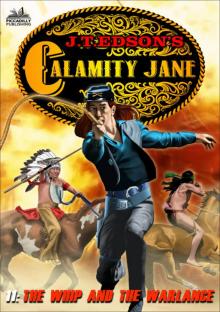 Calamity Jane 11
Calamity Jane 11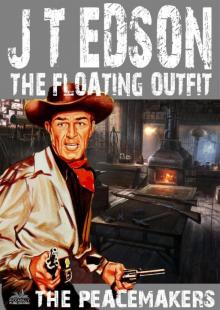 The Floating Outift 33
The Floating Outift 33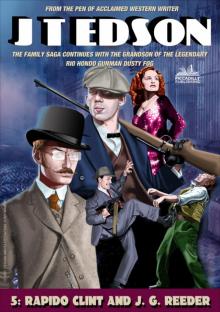 Cap Fog 5
Cap Fog 5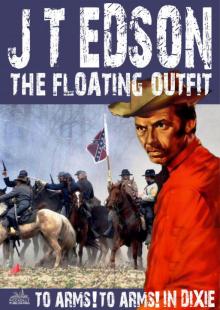 The Floating Outfit 34
The Floating Outfit 34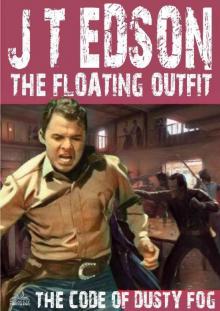 The Code of Dusty Fog
The Code of Dusty Fog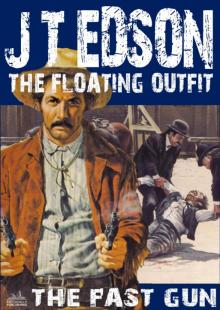 The Floating Outfit 21
The Floating Outfit 21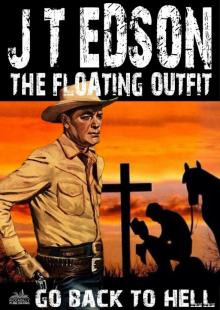 The Floating Outift 36
The Floating Outift 36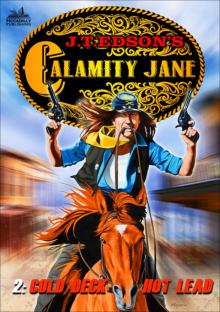 Calamity Jane 2
Calamity Jane 2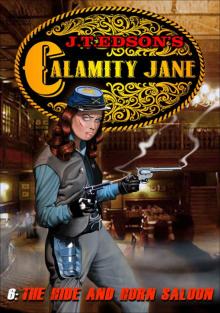 Calamity Jane 6: The Hide and Horn Saloon (A Calamity Jane Western)
Calamity Jane 6: The Hide and Horn Saloon (A Calamity Jane Western) Waco 7
Waco 7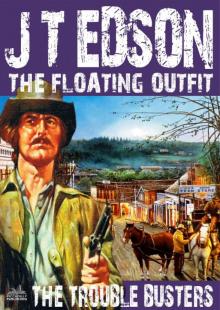 The Floating Outfit 25
The Floating Outfit 25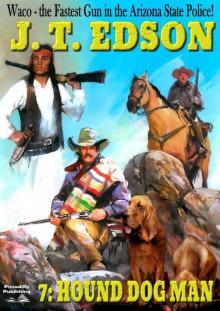 Waco 7: Hound Dog Man (A Waco Western)
Waco 7: Hound Dog Man (A Waco Western)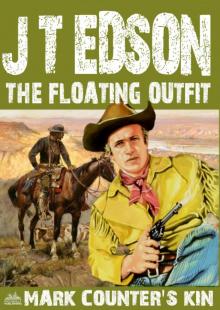 The Floating Outfit 47
The Floating Outfit 47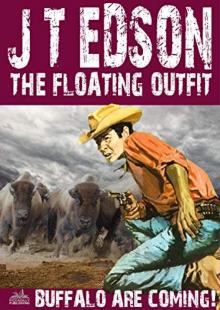 The Floating Outfit 42: Buffalo Are Coming!
The Floating Outfit 42: Buffalo Are Coming!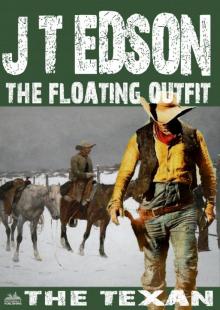 The Floating Outfit 46
The Floating Outfit 46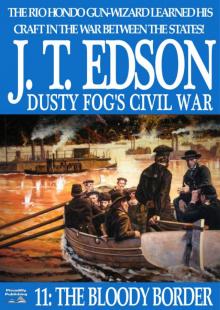 Dusty Fog's Civil War 11
Dusty Fog's Civil War 11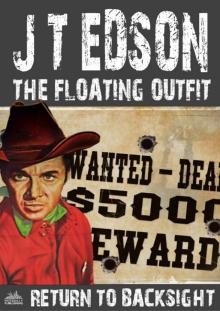 The Floating Outfit 61
The Floating Outfit 61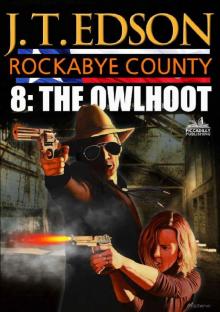 The Owlhoot
The Owlhoot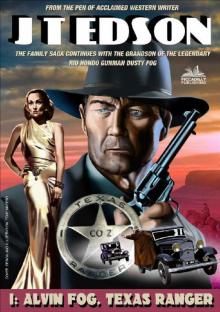 Alvin Fog, Texas Ranger
Alvin Fog, Texas Ranger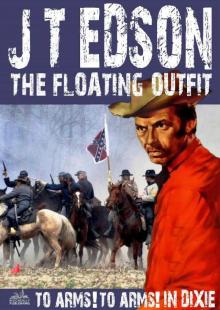 The Floating Outfit 34: To Arms! To Arms! In Dixie! (A Floating Outfit Western)
The Floating Outfit 34: To Arms! To Arms! In Dixie! (A Floating Outfit Western)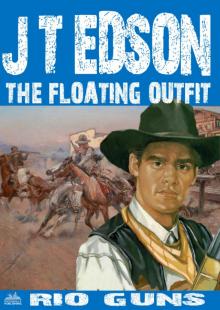 The Floating Outfit 44
The Floating Outfit 44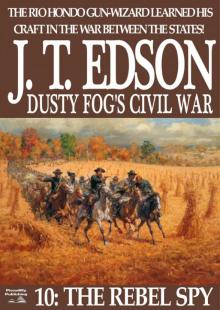 Dusty Fog's Civil War 10
Dusty Fog's Civil War 10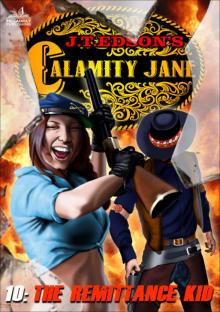 Calamity Jane 10
Calamity Jane 10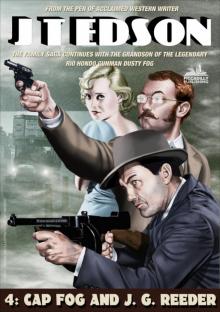 Cap Fog 4
Cap Fog 4 The Floating Outfit 51
The Floating Outfit 51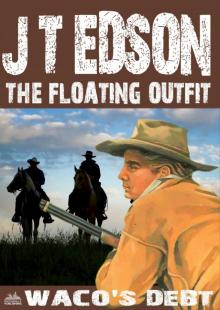 The Floating Outfit 50
The Floating Outfit 50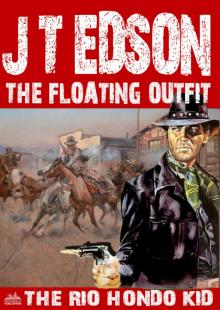 The Floating Outfit 49
The Floating Outfit 49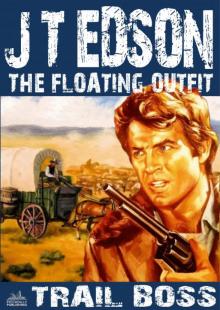 The Floating Outfit 10
The Floating Outfit 10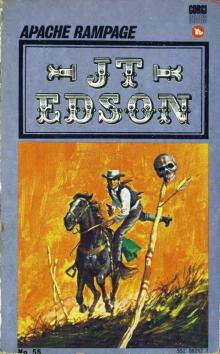 Apache Rampage
Apache Rampage The Floating Outfit 15
The Floating Outfit 15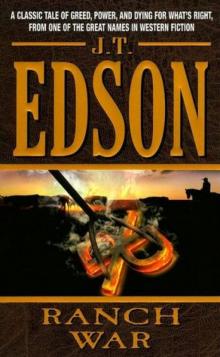 Ranch War
Ranch War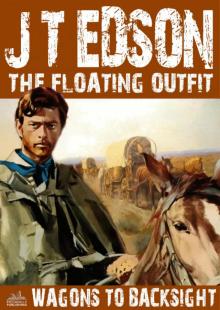 The Floating Outfit 11
The Floating Outfit 11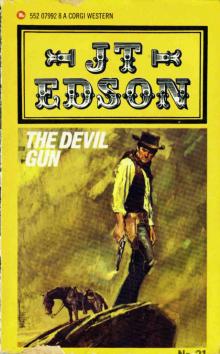 The Devil Gun
The Devil Gun Sacrifice for the Quagga God (A Bunduki Jungle Adventure Book 3)
Sacrifice for the Quagga God (A Bunduki Jungle Adventure Book 3)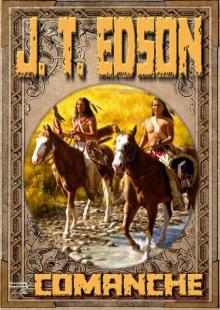 Comanche (A J.T. Edson Western Book 1)
Comanche (A J.T. Edson Western Book 1) The Floating Outfit 48
The Floating Outfit 48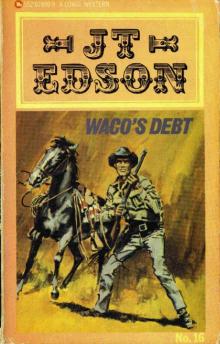 Wacos Debt
Wacos Debt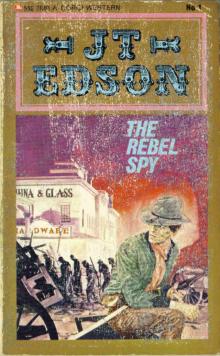 The Rebel Spy
The Rebel Spy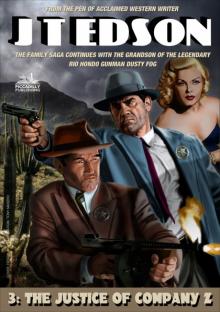 Cap Fog 3
Cap Fog 3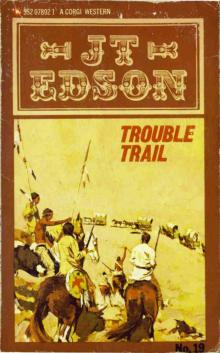 Trouble Trail
Trouble Trail Cold Deck, Hot Lead
Cold Deck, Hot Lead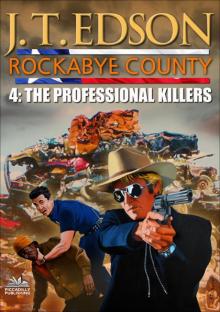 Rockabye County 4
Rockabye County 4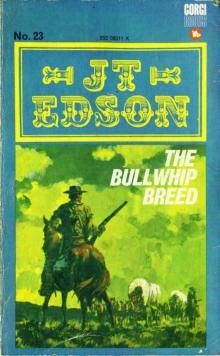 The Bullwhip Breed
The Bullwhip Breed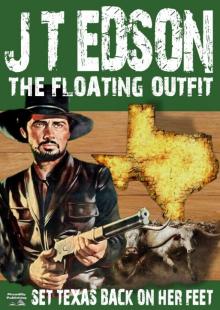 Set Texas Back On Her Feet (A Floating Outfit Western Book 6)
Set Texas Back On Her Feet (A Floating Outfit Western Book 6)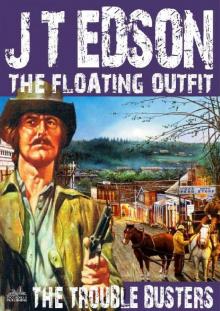 The Floating Outfit 25: The Trouble Busters (A Floating Outfit Western)
The Floating Outfit 25: The Trouble Busters (A Floating Outfit Western) Fearless Master of the Jungle (A Bunduki Jungle Adventure
Fearless Master of the Jungle (A Bunduki Jungle Adventure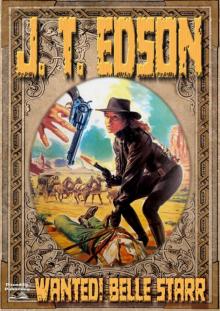 Wanted! Belle Starr!
Wanted! Belle Starr! The Big Hunt
The Big Hunt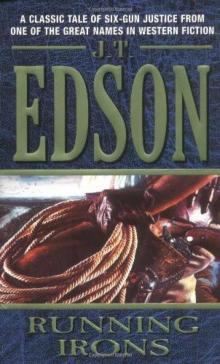 Running Irons
Running Irons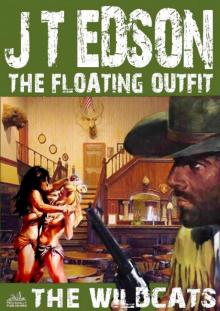 The Floating Outfit 19
The Floating Outfit 19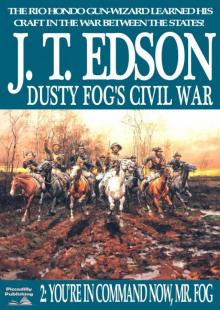 You're in Command Now, Mr Fog
You're in Command Now, Mr Fog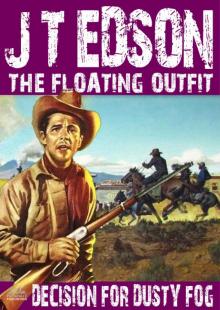 The Floating Outfit 27
The Floating Outfit 27 Texas Killers
Texas Killers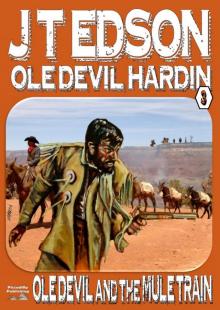 Ole Devil and the Mule Train (An Ole Devil Western Book 3)
Ole Devil and the Mule Train (An Ole Devil Western Book 3) Bunduki and Dawn (A Bunduki Jungle Adventure Book 2)
Bunduki and Dawn (A Bunduki Jungle Adventure Book 2)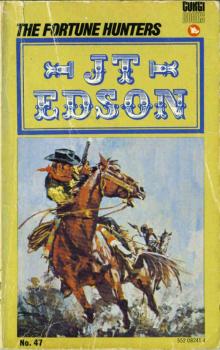 The Fortune Hunters
The Fortune Hunters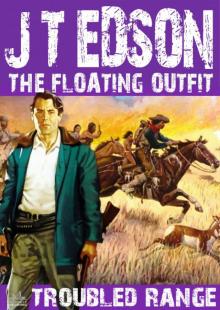 The Floating Outfit 12
The Floating Outfit 12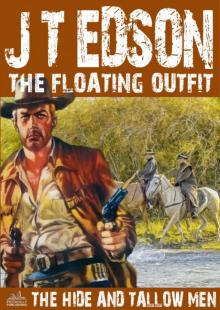 The Hide and Tallow Men (A Floating Outfit Western. Book 7)
The Hide and Tallow Men (A Floating Outfit Western. Book 7)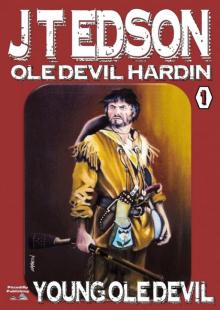 Young Ole Devil
Young Ole Devil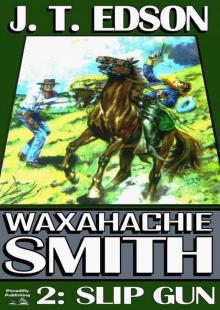 Slip Gun
Slip Gun The Drifter
The Drifter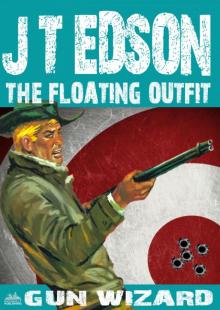 The Floating Outfit 45
The Floating Outfit 45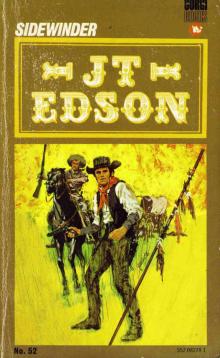 Sidewinder
Sidewinder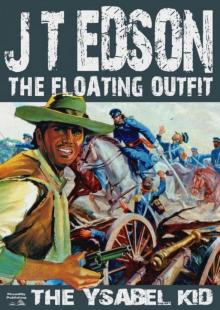 The Ysabel Kid
The Ysabel Kid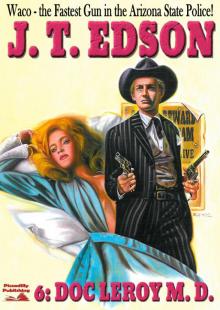 Waco 6
Waco 6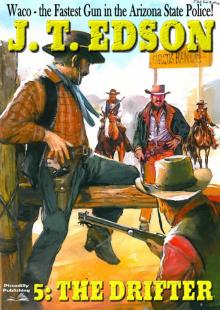 Waco 5
Waco 5 Point of Contact
Point of Contact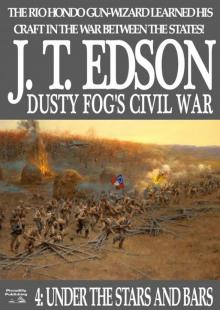 Under the Stars and Bars (A Dusty Fog Civil War Western Book 4)
Under the Stars and Bars (A Dusty Fog Civil War Western Book 4)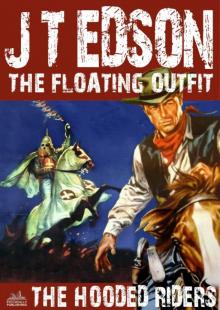 The Floating Outfit 9
The Floating Outfit 9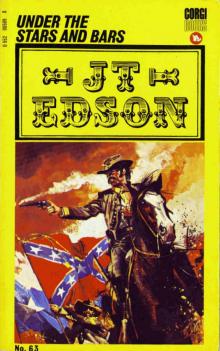 Under the Stars and Bars
Under the Stars and Bars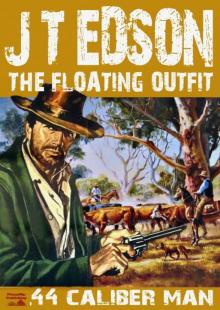 .44 Caliber Man
.44 Caliber Man The Floating Outfit 17
The Floating Outfit 17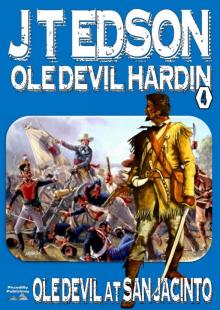 Ole Devil at San Jacinto (Old Devil Hardin Western Book 4)
Ole Devil at San Jacinto (Old Devil Hardin Western Book 4)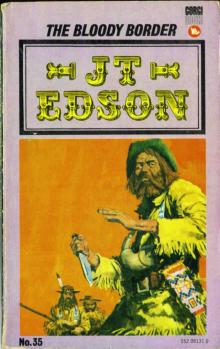 The Bloody Border
The Bloody Border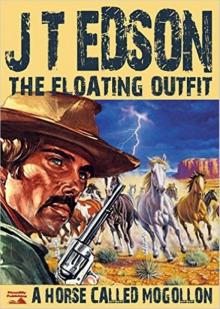 A Horse Called Mogollon (Floating Outfit Book 3)
A Horse Called Mogollon (Floating Outfit Book 3)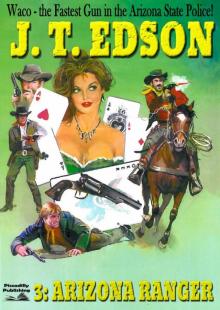 Waco 3
Waco 3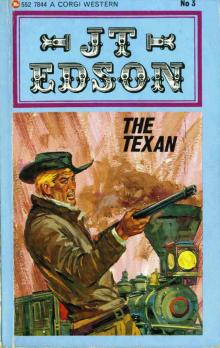 The Texan
The Texan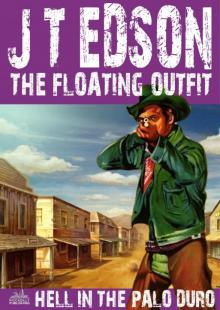 The Floating Outfit 35
The Floating Outfit 35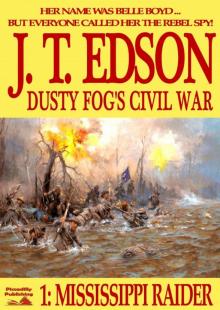 Mississippi Raider
Mississippi Raider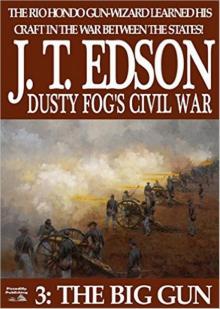 The Big Gun (Dusty Fog's Civil War Book 3)
The Big Gun (Dusty Fog's Civil War Book 3)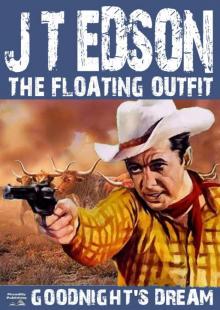 Goodnight's Dream (A Floating Outfit Western Book 4)
Goodnight's Dream (A Floating Outfit Western Book 4) Waco 4
Waco 4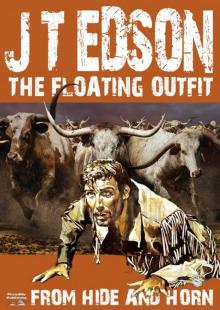 From Hide and Horn (A Floating Outfit Book Number 5)
From Hide and Horn (A Floating Outfit Book Number 5)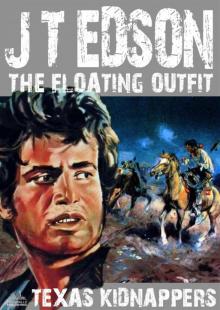 The Floating Outfit 18
The Floating Outfit 18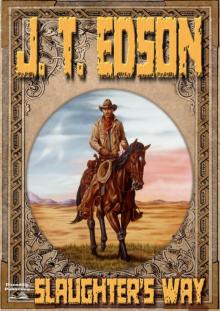 Slaughter's Way (A J.T. Edson Western)
Slaughter's Way (A J.T. Edson Western)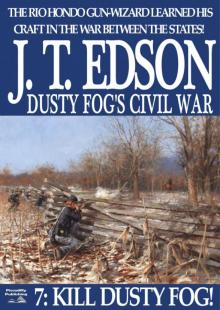 Dusty Fog's Civil War 7
Dusty Fog's Civil War 7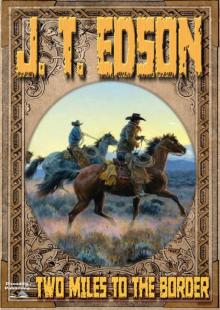 Two Miles to the Border (A J.T. Edson Western)
Two Miles to the Border (A J.T. Edson Western)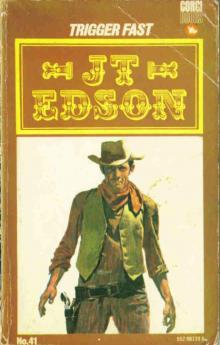 Trigger Fast
Trigger Fast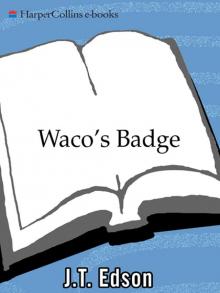 Waco's Badge
Waco's Badge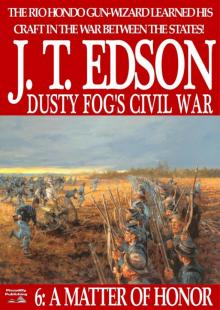 A Matter of Honor (Dusty Fog Civil War Book 6)
A Matter of Honor (Dusty Fog Civil War Book 6)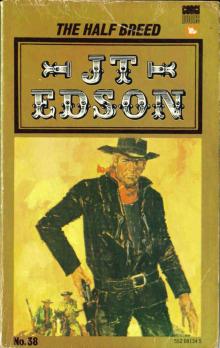 The Half Breed
The Half Breed Bunduki (Bunduki Series Book One)
Bunduki (Bunduki Series Book One)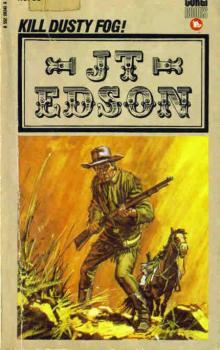 Kill Dusty Fog
Kill Dusty Fog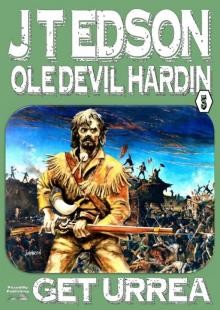 Get Urrea! (An Ole Devil Hardin Western Book 5)
Get Urrea! (An Ole Devil Hardin Western Book 5)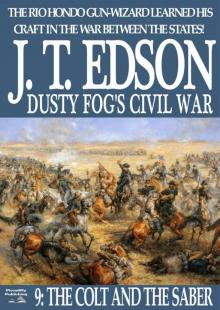 Dusty Fog's Civil War 9
Dusty Fog's Civil War 9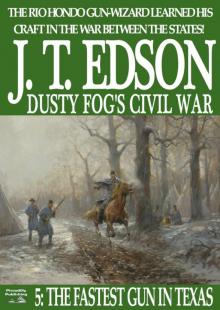 The Fastest Gun in Texas (A Dusty Fog Civil War Book 5)
The Fastest Gun in Texas (A Dusty Fog Civil War Book 5)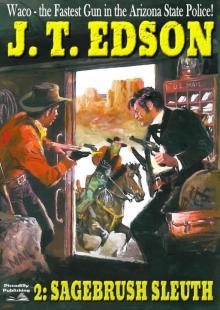 Sagebrush Sleuth (A Waco Western #2)
Sagebrush Sleuth (A Waco Western #2)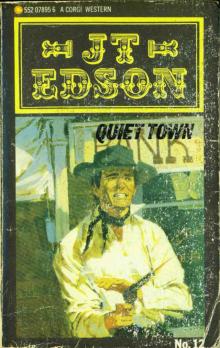 Quiet Town
Quiet Town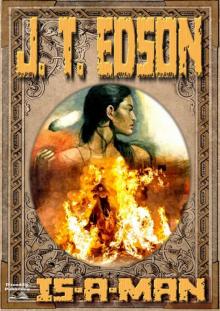 Is-A-Man (A J.T. Edson Standalone Western)
Is-A-Man (A J.T. Edson Standalone Western) Rockabye County 5
Rockabye County 5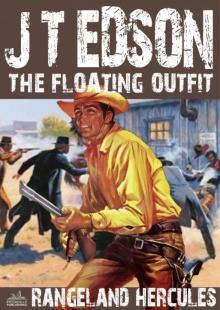 The Floating Outfit 14
The Floating Outfit 14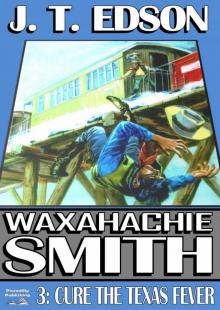 Cure the Texas Fever (A Waxahachie Smith Western--Book 3)
Cure the Texas Fever (A Waxahachie Smith Western--Book 3)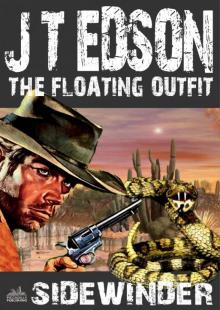 The Floating Outfit 13
The Floating Outfit 13 The Road to Ratchet Creek
The Road to Ratchet Creek